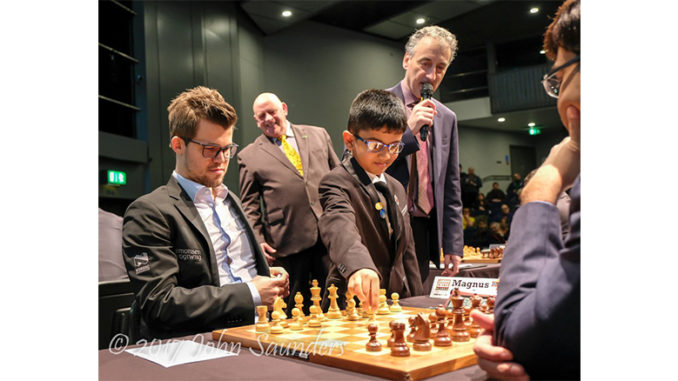
Nine-year-old chess player, Shreyas Royal, has just finished playing in the 2018 British Chess Championships in Hull. His final score of 5.5/9 in the ‘Open’ section, (just two points behind the winner), is not to be sniffed at. This is especially so, when we consider the fact that young Shreyas, played the event knowing that within weeks, he is set to be deported along with his family.
Shreyas was born in India, but his Father’s work brought him to the United Kingdom when he was three-years-of-age. Having been raised in the UK, Shreyas sees it as his home. And it is where he has learned chess and began what he hopes will be a career. Ultimately, he aims to become World Champion. However, his situation currently, is that he must leave the United Kingdom and go back to India by 10 September.
The issue is that Shreyas’s Father, Jitendra Singh is in the United Kingdom under a 2 tier long-term work permit visa. Policy says that in order to extend that visa, he must earn £120,000 a year. This is something that Jitendra realistically accepts is not going to happen.
And this is no disgrace at all! According to analysis by the Office for National Statistics, the average wage in the United Kingdom is £28,600 a year. And, as for the state-set National Living Wage … ? Well it gets nowhere near that mark! For those aged 25-years or over, the United Kingdom Government says that £7.83 per hour is perfectly adequate. That is around £16,000 a year.
Never-the-less, when his current visa expires in September, Jitendra, will have to return with his family to India. Even without a chess prodigy in the family, this seems extremely harsh to me. It is not like Mr. Singh has no job and doesn’t earn anything. It is not like he will be a burden to the tax payer. Rather ironically, he actually works for Tata, who sponsor the super chess tournament in Wijk aan Zee, the Netherlands, each January. And they say that job would continue. It is simply that the UK government, says that he has to earn the stipulated amount, in order to be eligible to extend his visa.
Like most Fathers, Jitendra is worried at the effect this will have on his Son and his chess development. I know that many will say that being based in India didn’t exactly do Vishy Anand any harm and they would of course be quite right. However, Shreyas has a very good support system in place in the UK. He is coached by Julian Simpole, for example. Julian also coached the likes of David Howell and Luke McShane. He describes his pupil as, “…something else,” and is confident that he will be a Grandmaster by eighteen. As great as that is in itself, Julian stated that there is the possibility that Shreyas could even do it at twelve.
Therefore, Mr. Singh has asked that the family be allowed to stay in the United Kingdom, so that Shreyas can continue to compete and develop his game. And he is not the only one. He is supported by Dominic Lawson, who is a well-known chess writer and the current President of the English Chess Federation.
Labour Members of Parliament, Rachel Reeves and Matthew Pennycook, have joined the calls to let Shreyas and his family stay. Themselves chess players, they have sent a joint letter to the Home Secretary, Sajid Javid, stating that if the family has to leave, the United Kingdom will lose an, “…exceptional talent.”. Former British Chess Champion, Chris Ward, goes even further. He is of the opinion that Shreyas (rated 1966) is, “…the best prospect the country has ever seen”.
This has, as yet, been to no avail. And now the case is making headline news. As sharp as ever, Peter Doggers covered it for chess.com and wider news outlets have also got hold of it. Shreyas’s situation has been publicised by the BBC, Guardian, and Times, to name but a few. Even British celebrity, John Cleese, has put in his two-penneth …
In the matter of the impending deportation of chess prodigy Shreyas Royal and his parents, the family cannot extend their visas because the father earns less that £120,000 per year
It is characteristic of this dreadful government that they put money before talent
— John Cleese (@JohnCleese) August 4, 2018
Unfortunately, even though the ridiculousness of this situation is clear and even though many are pleading Shreyas’s cause, it is unlikely to have the desired result. In commenting on the matter, the United Kingdom Home Office stated that, “Every visa case is assessed on its own merits in line with immigration rules.”
Piffle. This decision is pure politics.
To begin with, the timing is bad. There is a whole immigration overhaul underway in the United Kingdom at the moment. It is easy to assume that this is because of Brexit, but I don’t believe that to be the case. Immigration has been a sore subject for many of my fellow citizens in the UK for a while now, just as it has in many other European countries. While Brexit may have magnified this, it certainly did not start it.
Then there is the matter of the somewhat recent Windrush generation scandal. This concerned workers, who had arrived from British colonies, such as Jamaica and Trinidad and Tobago on the ‘HMT Empire Windrush’ in 1948. They came to the UK in their hundreds, attracted by the British Nationality Act of 1948. This gave citizenship to those living in the UK and gave those living in British colonies overseas the right to enter and settle.
Unfortunately, adequate documentation was not kept by the government. This has meant that decades later, many of those who immigrated under that nationality act, or their descendants, have found their legal status in the UK questioned. This has threatened their ability to work, get healthcare and many were threatened with deportation. Just some months ago, Prime Minister Theresa May apologised and assured those affected that they would be able to stay in the country. As far as I know, this is still in the process of being sorted out.
Currently, all of this makes exercising discretion when granting rights to stay extremely risky and a potential minefield.
Then there is the perceived lack of return to the nation. Simply put, it’s a chess player. Me and you know the beauty of our game, dear reader, we appreciate the genius of its best exponents. We know what a special thing it is for a nine-year-old to be playing like Shreyas is. We know why the mere possibility of him becoming a Grandmaster by the age of twelve is exciting. One does not even have to be British to see the value of someone who can perhaps be another Mickey Adams or Nigel Short … or even better.
Unfortunately, we are in the minority. Those dealing with this case, probably can’t even set the board up right, let alone anything else. And that is magnified by millions when you take the matter to the public, most of whom have never touched a piece and for whom chess is neither here nor there. If this was a sport, such as tennis, football or athletics, it would be a different matter. If Shreyas was a female tennis player, who could rival Serena Williams and win Wimbledon, oh my word. If only he could boot them in like Harry Kane or was odds on to win a gold medal–any medal … possibly …–at the next Olympics.
For then, we would most likely only hear the name, Shreyas Royal, as he bursts onto the scene, announced as the next great discovery or home-grown talent. For it would not be a mere question of extending a visa, then, there would be citizenship. The seal of approval would be given before the ink on the form was dry. The development program would all be in place and no doubt the National Lottery funding would follow.
Unfortunately for Shreyas, he is just a nine-year-old boy who likes to play chess. And even if he does end up winning a medal for the United Kingdom, it’s only going to be at a chess Olympiad sometime in the future. That is not going to see any parades or calls for a knighthood. Merits indeed — just not the right ones.
“My son is very sad that he has to leave the country where he has grown up,” Mr. Singh told the Times. “He keeps asking a lot of questions like, ‘Dad, why do we have to leave?’ ” Well, the above is why. It is undeniable that in order for Jitendra to be able to renew his visa and stay in the United Kingdom, with Shreyas and the rest of his family, an exception would be needed. Not a huge one, but one none-the-less.
Such moves require vision. They come from an ability to ignore the peripheral and just focus on the situation in question, to see its potential given the right strategy and undertakings. It takes guts to deviate from the norm, to create exciting possibilities by just doing what seems right there and then, even if it is a risk. Unfortunately, those making the decision in this instance just don’t have what it takes.
Perhaps they should play more chess.
Update:
Typically, just shortly after I published this post, news broke that this decision had been reversed! Mr. Singh will be allowed to remain in the United Kingdom under his current visa arrangement. This is wonderful news!
Nine-year-old chess prodigy told he can stay in UK https://t.co/27HPiknBKi
— The Guardian (@guardian) August 10, 2018

